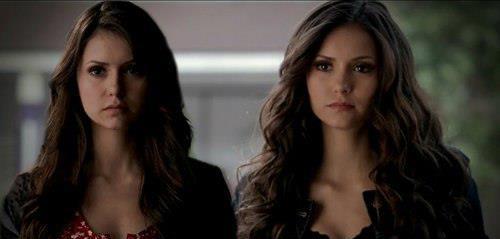I am a fan of The Vampire Diaries, which is my kind of soap opera: high school (originally) and vampires. See also: Buffy the Vampire Slayer.
However, recently I realized it has absolutely obliterated my interest in doppelganger plot-lines. I noticed this as we entered into the second half of Once Upon a Time Season 3, wherein the main cast returns from Neverland to Storybrooke. [Spoiler warning]. In a last ditch effort to keep himself alive, Peter Pan pulls a “Grand Theft Me” on Henry, swapping bodies and sending Henry into Pandora’s Box, and Pan into the loving arms of Henry’s extended fairy tale family. He then plots to turn Storybrooke into a New Neverland (would have been the lamest Neverland ever, seriously).
Although I had been tipped off to this plot twist via IMDB’s cast list, as soon as happened, I sighed disparagingly. And that was the moment that I realized that Vampire Diaries had nailed the lid on the coffin of this trope for me.
 Over the course of 5 seasons, Vampire Diaries has used the doppelganger trope ad nauseum. Elena and Katherine has been a seasonal showdown, but during this last season, Katherine ported herself magically into Elena’s body and forced Elena’s consciousness down. During this time, Katherine attempted to act like Elena but did so quite poorly. Since everyone thought Katherine dead, they were extra idiotic about “Elena’s” odd behaviors. Katherine’s charade went on for many episodes, which is like seasons for the fast turning plot of Vampire Diaries. When they did finally get Elena back in her own body and Katherine got whisked away to the void, Elena was understandably irate that her friends had failed to notice it wasn’t her. But honestly, she wasn’t near angry enough. Their absolute failure to recognize there was something wrong bordered on the absurd. She should have left Mystic Falls and never returned after seeing how inattentive her friends were.
Over the course of 5 seasons, Vampire Diaries has used the doppelganger trope ad nauseum. Elena and Katherine has been a seasonal showdown, but during this last season, Katherine ported herself magically into Elena’s body and forced Elena’s consciousness down. During this time, Katherine attempted to act like Elena but did so quite poorly. Since everyone thought Katherine dead, they were extra idiotic about “Elena’s” odd behaviors. Katherine’s charade went on for many episodes, which is like seasons for the fast turning plot of Vampire Diaries. When they did finally get Elena back in her own body and Katherine got whisked away to the void, Elena was understandably irate that her friends had failed to notice it wasn’t her. But honestly, she wasn’t near angry enough. Their absolute failure to recognize there was something wrong bordered on the absurd. She should have left Mystic Falls and never returned after seeing how inattentive her friends were.
But this was just the most recent of their doppelganger plot-lines. Stefan also has an evil doppleganger who mucks up trouble in multiple seasons. Actually, both of them have two doppelgangers. Though I find it promising that last season made Stefan and Elena the last living doppelgangers. So maybe the show has put the trope to rest.
However, let me credit Once Upon A Time for handling it judiciously. First, Emma wasn’t an idiot and noticed pretty quickly that Henry wasn’t acting normally, and Regina’s naivety about the switch was believable due to her desire to have Henry need her. Second, it was only about one whole episode before the body switch was discovered and another half episode before it was reversed. Finally, the conclusion to the whole Pan arc had huge emotional pay offs. Although I was wary of the doppelganger trope when it showed up, I came to value where it took the characters and the show.
But let me clarify that it seems my ire only gets tripped with dramatic uses of the doppelganger. I never seem to get tired of the doppelganger trope being used in a comedic fashion. See: The X-Files “Dreamland,” Farscape “Out of Their Minds,” and Buffy the Vampire Slayer “Doppelgangland.”
It’s apparently the dramatic irony that I loathe. In these body swapping instances writers are ruthless about twisting the viewers’ emotions and expectations. Often it will be used as an excuse to allow a couple to get together (but then go back on it once the swap is reversed). An example of this is in the season 4 X-Files episode “Small Potatoes” when shape shifting villain Eddie Van Blundt masquerades as Mulder and puts the moves on Scully, one of the funniest episodes of that season. Alternatively, the writers will drive a wedge in a relationship by having the doppelganger say or do something unforgivable that can’t be forgiven and forgotten even after their true identity is revealed. This was done on Vampire Diaries in episode 5.12 “The Devil Inside” when Katherine, in Elena’s body, rejects Damon’s heartfelt speech to get back together with words that speak to his greatest insecurity. This scene is played for absolute heartbreak.
Perhaps the key is that comedies end with a happy restoration of the status quo and dramas end with a sad, ironic gut punch. I end up often feeling manipulated by a dramatic doppelganger and then resenting that manipulation.
Television, let the dramatic doppelganger die.

September 14, 2014 at 4:07 pm
Yes yes a thousand times yes. Especially the dramatic irony part. Years ago, one of my favorite shows in this type of genre, “Ghost Whisperer” jumped the shark and was completely ruined by a doppelganger plot that went on forever.
LikeLike